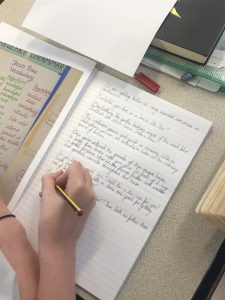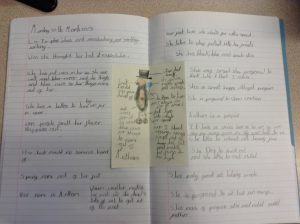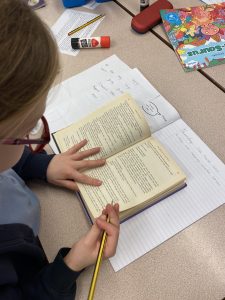Subject Leader: Miss N Wild and Miss S Bonner – Reading.
Mrs S Scott – Writing
English has an important part to play in both education and society. A high-quality education in English will teach children to speak and write fluently so that they can communicate their ideas and emotions to others, and through their reading and listening, others can communicate with them. All the skills of English are essential to participating fully as a member of a school and society.
English consists of a range of skills which children learn to use to communicate through reading and writing. Our aim is that all of our children become independent learners, who can apply their reading and writing in all areas of the curriculum and endeavour to use these in everyday life. At Normanton Common Our approach to the curriculum in English is based upon a language rich, active learning experience where writing makes children’s thinking and learning visible and permanent allowing children to immerse themselves in new skills and vocabulary.
Writing provides children with a vehicle to express who they are as people and to actively engage in daily life. It provides children with opportunities to explain and refine their ideas to others and themselves. The purpose and use of writing is wide and varied and each one has value in its own right.
Through reading, children have a chance to develop culturally, emotionally, intellectually, socially and spiritually. The choice of books they read, play a key role in such development. Reading also enables pupils both to acquire knowledge and to build on what they already know in other areas of the curriculum and the wider world. Learning to read is about listening and understanding as well as working out what’s printed on the page. It provides them with background knowledge on their world, which helps them make sense of what they see, hear, and read. It is the talk that surrounds the reading that gives it power, helping children to bridge what is in the text rather than just the vocalization of the words. This helps them build their own vocabulary and improve their understanding.
In English pupils will have the opportunity to:
- Become an independent learner.
- Work with a range of high quality texts which promote diversity and cultural differences.
- Learn through a language, rich active learning experience.
- Apply their skills to explain and refine their ideas.
- Link their skills in English across the curriculum.
How is the content / theme chosen?
The content is chosen to make effective links with key themes and ensure coverage of the expectations as set out in the National Curriculum programmes of study, as well as the EYFS framework. At Normanton Common Primary Academy we ensure a clear, sequenced progression, which is taught systematically for all pupils to acquire the intended knowledge and skills. The content may be adapted or changed, based upon the needs or interests of specific cohorts.
How do we ensure progression of knowledge and skills?
At Normanton Common Primary Academy we have in place, for each subject area, a knowledge and skills progression document, which is used for planning, to ensure sequenced and appropriate content for specific year groups. Teachers are clear on the learning and expectations for each year group, as this has been carefully selected and mapped out so that children are building on prior knowledge and skills each term and each year. Within these documents there are opportunities for differentiation, in order to meet the needs of all learners.
English lessons are carefully planned through our themes, so that valuable links can be made across other subjects. A long term rolling programme maps out the coverage of the discrete teaching and learning opportunities for children to develop and embed specific skills. This ensures coverage of the National Curriculum, for English across Key Stage 1 and 2 and work within and beyond the Early Year’s Framework across our Foundation Stage.
How is the subject taught?
The school uses an agreed teaching sequence for reading and writing this differs for each key stage which can be viewed in the English policy. Further to this Read, Write, Inc is used in early years and KS1 to develop early Reading.
English lessons are carefully planned through our themes, so that valuable links can be made across other subjects. The coverage of the knowledge and skills in English are taught inline with the national curriculum objectives, ensuring the needs of the cohort and individuals are met. There is a strong focus on developing the vocabulary of our children and the retention of this through learning opportunities allowing children to immerse themselves in new skills and vocabulary resulting in a permanent, sustained knowledge.
New vocabulary is taught, with the emphasis on key words and phrases inclusive of those within the national curriculum and topics taught . Although we actively introduce and are ambitious with the language we use, we understand the importance not to over complicate this language with very young children, but ensure underlying principles and meanings of the words are taught and understood.
Children are introduced to and reminded of key vocabulary. Questioning is used to check their understanding and prior knowledge, before new concepts, skills or knowledge are introduced.
Modelling is used by class teachers to clarify expectations, children are then given plentiful opportunities to consolidate, build upon and apply basic skills and knowledge, across a series of lessons, as well as across the wider curriculum.
Teaching English in EYFS
The children are expected to develop a specific set of skills and knowledge appropriate to their age. We prepare our children with the knowledge and skills they will need in English, ready for year 1.
Children in EYFS are given the opportunity to explore, investigate, question and continually practise and embed their language and leaning through the areas of provision set up in the indoor and outdoor learning environments. Speaking and listening is pivotal to the language development of children in EYFS and is embedded across all areas of the curriculum.
How do we know that our children are making progress?
Ongoing assessments of the children’s knowledge and skills is observed by the class teacher. Misconceptions are addressed and next steps carefully planned. Children’s outcomes are compared to the exemplification documents and national curriculum objectives. At the end of every half term internal moderation takes place between key stages where teachers gather a range of evidence from each child and discuss objectives achieved and next steps to move the learning on.
How do we promote our Curriculum Intent?
Active Learners
During English children will have the opportunity to both participate in a range of activities both independently and collaboratively. This will equip them with the tools to improve their independence, teamwork and communication. Through the editing process children develop resilience as they persevere to up level and address errors. Through carefully presented work children display a sense of pride and achievement.
Active Communicators
Normanton Common is a language rich school. In English, children will be exposed to a wide range of vocabulary throughout every lesson. Lots of the vocabulary used is transferable to other areas of the curriculum.. Children will have the opportunity to use their oracy skills to provide feedback and evaluate their own and others’ questioning and work.
What wider opportunities are provided for our children?
Children have the opportunity to participate within whole school reading reward systems for example Reading Stars.
English in action...



